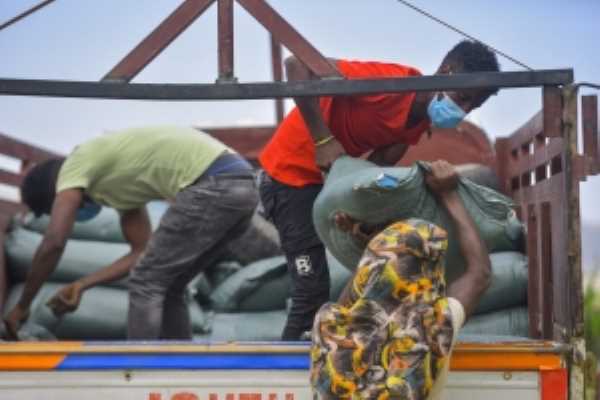
The Food and Agriculture Organization of the United Nations (FAO) delivered the first batch of 262 tonnes of fertilizers to Tigray in collaboration with the Government of Ethiopia. The fertilizers handed over today are part of the 19,300 tonnes secured by FAO and partners to provide urgent support to farmers to plant in the Meher planting season, improve crop production and curb the risk of food insecurity in the region.
“The arrival of the fertilizers in Tigray marks an important step in restoring the capacity of farmers to produce their own food. We will continue to provide support to vulnerable communities”, said Chimimba David Phiri, FAO Representative for Ethiopia a.i. “FAO, as the Agriculture Cluster Lead Agency, wishes to commend the Ministry of Agriculture, the Ethiopian Agriculture Business Commission and all partners involved for tremendous work in facilitating the delivery of the NPS and urea fertilizer. I particularly recognize the support of resource partners for their prompt response to our appeal”, added Phiri.
Read more: Tigray – Time is running out to avert worrying levels of food insecurity
In the coming weeks, FAO and partners are planning to provide 60 000 tonnes of fertilizers to farmers to support crop production. Even though time is running out, there is still time to purchase and deliver urea fertilizer, taking advantage of the offer by the Government of Ethiopia to purchase fertilizers at cost price. A new planting window will open by October when the ‘irrigation season’ will commence. With resources made available thus far, the gap stands at 40 000 MT (the financial gap stands at USD 53 million).
With the rainfall outlook foreseen to be favourable in Tigray, the provision of fertilizer offers a crucial and cost-effective way to improve food availability across the region. Although the window for providing certain seeds is fast closing, there is still time for farmers to receive legume seeds, seedlings for tubers and other planting materials and enable them to take advantage of the favourable rainfall forecasts to produce steady supplies of nutritious foods.
FAO continues to call for financial, material and technical support to Tigray as well as other areas affected by the conflict, such as Amhara and Afar regions.
The need for urgent partnership
The provision of fertilizer through FAO is being supported by the Government of Belgium, UN Central Emergency Response Fund, the Government of France, the Swiss Agency for Development and Cooperation, and
U.S. Agency for International Development (USAID). Agriculture Cluster members currently involved in the inputs programme in Tigray are – Action Against Hunger (AAH), The International Committee of the Red Cross (ICRC), CARE, WeForest and ZOA.
Without improved seeds and fertilizers at least at similar levels to 2021, farmers will likely see a considerable drop in production compared with last year, further pushing up levels of acute food insecurity. If farmers receive the inputs they need, they will be able to harvest and begin consuming the produce as early as October 2022.
n 2021, Tigray’s farmers produced 900 000 tonnes of staple foods, accounting for 40 per cent of normal production, equivalent to seven to eight months of annual cereal needs for the region. The production success in 2021 was possible because farmers had access to improved seeds and fertilizers provided by the Government and Agriculture Cluster partners. With limited humanitarian assistance and commercial supplies, the rainfed crops and irrigated vegetables have been critical to the survival of rural families, including some 1.8 million internally displaced people, about 60 per cent of whom reside within host communities.







